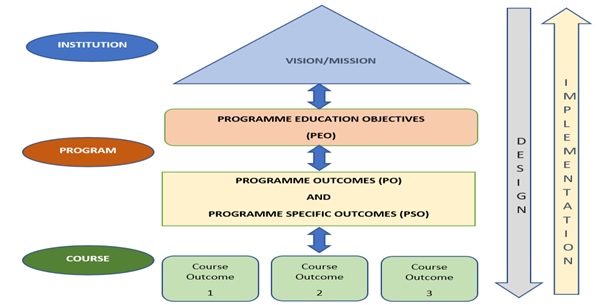“Education is not the learning of facts, but training the mind to think”- Albert Einstein
The main aim of Higher Education system should be to prepare young minds who can participate a in knowledge-driven society and can also improve the national economy in globalized world. Today era of competitiveness demands to raise the academic standards where students are no longer required to be treated as knowledge receiver while they enjoy their equal involvement in sharing knowledge with teacher and expects the teacher to be guide in showing the path for right implementation of their skills. Such kind of Education approach can be implemented under Outcome-oriented Education model or Outcome Based Learning (OBE).
What is OBE
OBE is acronym of Outcome Based Education which demands every element including Instruction, Curriculum and Assessment of Educational system should be focused around a set of learning outcomes in such a way that Learning should actually happen.
In simple words, OBE is a paradigm shift in Education system that shifts the focus of Education from Instructional Objectives to Observable Outcomes.
What are Outcomes:
Outcomes are the tangible actions that demonstrate the learning of students at the end of Course or Program. The verbs given in Bloom’s taxonomy framework clearly give the performance indicators to be used while designing learning Outcomes.
OBE framework
Following diagram presents the OBE implementation structure in Higher Education Institutes with the mentioned outcomes given as:

- Programme Outcomes (POs) are the confined statements deals with the competencies what students are expected to possess by the time of graduation. POs are expected to be aligned with knowledge, skills and attitudes of a graduate.
- Program Educational Objectives (PEOs) are the comprehensive statements that describe the career and professional goals that the program is preparing graduates to achieve.
- Program Specific Outcomes (PSOs) are statements that describe what the graduates of a specific program should be able to do.
- Course Outcome (CO) are the statements that reflect the cognitive knowledge skills that a course provides and a learner can demonstrate at the end of a theory, practical or theory cum practical subject.
Benefits of OBE:
In the traditional method of learning, teacher is always responsible for imparting knowledge which is based on rigid instruction-driven methodology and demonstrates what the instructors practice while OBE model is a flexible approach where students take the responsibility for the actualization of learning and teacher facilitates the conducive learning ecosystem to consolidate the competencies and innovative education. Following are the major benefits of OBE:
Outcomes-oriented: OBE implementation gives the clear insights of accomplishments by the end of learning at all levels, to both students and instructors. Students find the learning expectations beforehand and teachers can tailor their teaching strategies accordingly. The predefined learning outcomes also make the other fundamental components such as curriculum, content, assessment easy to be designed and practiced to achieve the desired knowledge and skills.
Outcomes-Mapping: The predefined outcomes make the analysis easier by mapping the progress of Institute with the articulated outcomes that reflects their improvement domains. Similarly, the mapping of students’ performance with defined outcomes allows tracking the accomplishment curve of the students.
Flexibility: OBE calls for student-centric learning which is not dependent on specific instruction methodology while the teacher acts as a facilitator where he is expected to recognized the diverse needs of students and structure his teaching approach in line with the accomplishment of learning goals.
Engagement: Students’ engagement in the learning sessions is the vital element of OBE. Students get the full-time access to study material and other resource which make them govern their own learning. Teachers are expected to guide them in the classroom sessions to make the best of time in brainstorming and innovative activities to involve them in skill-based learning.
Curriculum structure under OBE model:
Curriculum composition under OBE model is always oriented towards the globally adapted outcomes that can facilitate quality teaching-learning strategies and assessment ensuring seamless international mobility of students.
Teaching and Assessment under OBE framework
The teaching practices under OBE paradigm are customized according to the individual needs of students and required to follow active pedagogical practices to empower practical skills, technology-driven and field-based that can demonstrate the connection between theory and its applications.
The assessment procedures also concentrate on the progress direction of learning outcomes of course or program. Such assessment methods comprise time-based examination, open-book tests, assignments, project demonstration etc. which can clearly reflect the accomplishment of outcomes and ultimately the skill-set and values of the learners.

Recently UGC has released a ‘Quality mandate’, 277-page book that emphasises the implementation of Outcome-based academic activities in Higher Education Institutes that focus on skills and outcomes. iCloudEMS is a Cloud-based Education management system that understands the importance of learner-centric approach towards building the knowledge, skills and aptitude in students to bring sustainable national development. Our advanced products help Higher Education Institutes to reform their education system by aligning their workflow in line with OBE guidelines.
OBE is all about outcomes-oriented education and we at iCloudEMS deploy innovative technological features that automate the designing and mapping of outcomes in all the academic elements with its following attributes:
- A cloud-based server to store huge amount of data and records for effortless record management that assist the instructors to track the accomplishment status of outcomes.
- Innovative solutions to automate attendance record, timetable preparation, assignment uploading, results publishing to help the students in self-govern their learning.
- Smart course opting and allotment strategies to empower flexible and progressive learning culture
- OBE-LMS that boost the Outcomes-oriented culture by creating engaging course content and assignments with creative outcomes designing and mapping approach.
- NBA directly states: ‘No OBE, No Accreditation’. Our OBE supported executions, opens the door of accreditation for Institutes and our Accreditation management system computerizes the groundwork of regulatory exercises to save valuable time and efforts of the staff in performing repeated and tedious tasks.
- Student-lifecycle management system, to access the entire academic journey of the students with a couple of clicks only that empowers the student-centric learning by nurturing Continuous Quality Improvement ecosystem.
- Online Classes and Examinations system to foster strategic execution of OBE in all pre and post examination activities ranging from preparing Question papers to publishing final results, all take care of designing and mapping of all components with re-established outcomes.
- An affordable and user-friendly portal with powerful reporting tools for the quick statistical analysis at all levels.
In a nutshell it can be stated that OBE is the quality academic journey of Higher Education Institutes that is geared towards WHAT is learned, and WHETHER is learned well to make the graduates well-capable to enter in the challenging real-world. iCloudEMS technologies the campus that incorporates automated mapping of course and program attributes compliant to OBE and Bloom’s taxonomy and furnishes all the requirements to model learner-centric education in Higher Education Institutes.

